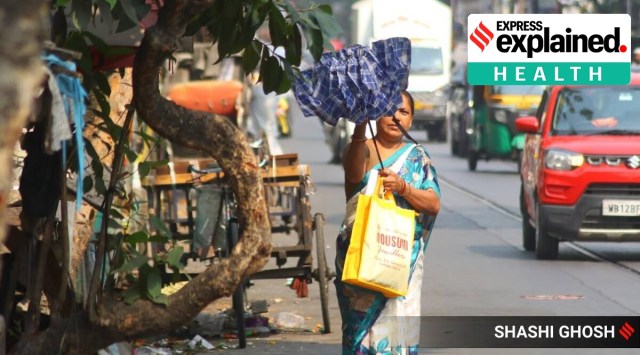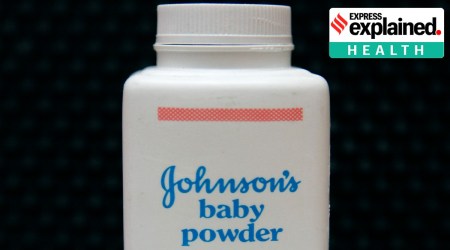Heatwave deaths: Why a heat stroke kills, and how to stay safe
To prevent heat stroke, it is better to avoid stepping out in direct sunlight, especially between noon and 3 pm. You should avoid strenuous activity during this time.
 We all feel drained and tired after stepping out on an extremely hot day. This is referred to as heat exhaustion, which happens when the body sweats excessively to keep the core temperature low.
We all feel drained and tired after stepping out on an extremely hot day. This is referred to as heat exhaustion, which happens when the body sweats excessively to keep the core temperature low. Amid heatwave deaths being reported in parts of the country, Union Health minister Mansukh Mandaviya on Tuesday held a meeting with senior officials of the India Meteorological Department, National Disaster Management Authority, and the Health ministry. Mandaviya said central teams would be rushed to the affected states to guide the governments.
He also asked the Indian Council of Medical Research to develop short-term and long-term plans in coordination with other agencies to prevent such deaths.
How does heat affect the body?
We all feel drained and tired after stepping out on an extremely hot day. This is referred to as heat exhaustion, which happens when the body sweats excessively to keep the core temperature low.
“This is the reason we advise people to stay well hydrated on hot days. People with heat exhaustion, however, are unlikely to die. They will recover once they are back in cool areas and take fluids. People who come in with heat strokes are the ones to worry about,” said Dr Suranjit Chatterjee, senior consultant of internal medicine at Indraprastha Apollo Hospital, New Delhi.
A heat stroke happens when the ambient temperature is so high that the body is unable to sweat to regulate the core temperature, which shoots up to 40 degree C (or 104 degree F). In these cases, there is a severe imbalance of salts such as sodium and potassium in the body. The high core temperature coupled with salt imbalances disrupts organs, leading to a host of symptoms.
“It can affect the brain, making a person foggy, drowsy, and in severe cases may also lead to a person going into a coma. It can lead to kidney and liver damage as well. A cascade of such symptoms leads to death due to heat stroke,” said Dr Chatterjee. He added that in such severe cases, the aim is to bring down the core temperature of the body fast. This can be done by pouring cold water over the person, making them drink cold drinks, and giving them electrolytes to balance salt levels.
When should you rush to a hospital?
Dr Chatterjee said that a person should be taken to a hospital immediately if they are exhibiting these symptoms: their body temperature is very high but they are not sweating at all, they are feeling drowsy, they are vomiting, they are not passing urine, and they are not breathing properly.
Special care should be given to those who are old and very young and those who have comorbidities as they are more prone to the impacts of heat. “However, this does not mean that young people cannot get heat stroke, it can happen at any age,” said Dr Chatterjee.
What to do to prevent a heat stroke?
To prevent heat stroke, it is better to avoid stepping out in direct sunlight, especially between noon and 3 pm. You should avoid strenuous activity during this time.
If you have to step out, ensure you keep drinking water even if you do not feel thirsty. Drink other hydrating fluids like lassi, lemon water, buttermilk or ORS that can maintain electrolyte levels. Do not consume alcohol, tea, coffee and carbonated soft drinks as they can dehydrate you further. Wear lightweight, light-coloured, loose, and porous cotton clothes and use goggles, umbrellas, and shoes.
An advisory by the National Disaster Management Authority says that people should try to keep their homes cool by using curtains or shades, and to keep body temperature low by using a damp cloth or taking cold baths frequently.
Heat action plans that predict heat waves and awareness drives by local governments can bring down mortality due to intense heat. Dr Dileep Mavlankar, former director of the Indian Institute of Public Health, Gandhinagar, whose team developed one of the first heat action plans in the country for Ahmedabad, said it resulted in a 30% to 40% reduction in mortality in the city.
Why are humidity, night-time temperatures important?
Dr Mavlankar explained that when the humidity levels are high, perceived temperatures are higher than the actual reading for ambient temperature. High humidity levels also mean that sweat does not evaporate effectively to keep the body cool.
“If night temperatures also remain high, the body doesn’t get time to rest. Suppose you step out when it is 44 degree C, if you come back indoors to a cooler place in a few hours, you feel relief. The body finds this relief when the night temperatures are low. If the temperatures are not low even at night for a couple of days, the body cannot recoup,” said Dr Mavalankar.







































